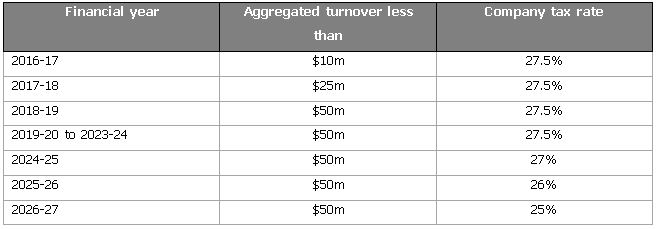This year’s Federal Budget brought lukewarm news for small businesses. On a positive note, the instant asset write-off for small businesses has been extended and the Government re-affirmed its commitment existing ten year enterprise tax plan. Increasing ATO focus on the black and digital economy is in the pipeline. Daniel Arnephy highlights the key changes for businesses.

Small business
The Treasurer was unequivocal in the Government’s support for business and SMEs in particular, encouraging people to start their own business or alternatively encouraging businesses to keep creating jobs.
Measures announced that impact small businesses are as follows:
- The instant asset write-off of $20,000 has once again been extended for another year, so SBE entities (essentially group aggregated turnover less than $10m) can immediately deduct the cost of expenditure on business assets costing less than $20,000 until 30 June 2019.
- Division 7A has an amendment to confirm that unpaid present entitlements from trusts come within the scope of Division 7A. In summary, this will ensure that trust profit distributed to companies is repaid over time, or subject to tax as a dividend. This will apply from 1 July 2019, although whether any existing grandfathering rules are maintained is yet to be seen.
- More substantial Division 7A amendments previously intended to apply from 1 July 2018 have been deferred to now apply from 1 July 2019. This will enable all Division 7A amendments to be delivered as part of a consolidated package.
- From 1 July 2019 there will be stronger anti-avoidance rules for closely held trusts that engage in circular/round-robin distributions to avoid any tax being paid on the distributed amount.
- Partnership integrity measure – Partners who alienate their income by assignment or dealing in rights to future partnership income will no longer have access to small business CGT Concessions in relation to these rights. This will apply from 7:30pm AEST 8 May 2018.
Research and Development (R&D) overhaul
Research and Development has always been a complicated area of taxation and seemingly under-resourced from a compliance view, creating problems with current implementation and compliance. To better target the program, improve integrity and fiscal affordability, changes to R&D will apply for income years starting on or after 1 July 2018. The Budget papers describe the changes as follows:
For companies with aggregated annual turnover of $20 million or more, the Government will introduce an R&D premium that ties the rates of the non-refundable R&D tax offset to the incremental intensity of R&D expenditure as a proportion of total expenditure for the year. The marginal R&D premium will be the claimant’s company tax rate plus:
- 4 percentage points for R&D expenditure between 0 per cent to 2 per cent R&D intensity;
- 6.5 percentage points for R&D expenditure above 2 per cent to 5 per cent R&D intensity;
- 9 percentage points for R&D expenditure above 5 per cent to 10 per cent R&D intensity; and
- 12.5 percentage points for R&D expenditure above 10 per cent R&D intensity.
The R&D expenditure threshold — the maximum amount of R&D expenditure eligible for concessional R&D tax offsets, will be increased from $100 million to $150 million per annum.
For companies with aggregated annual turnover below $20 million, the refundable R&D offset will be a premium of 13.5 percentage points above a claimant’s company tax rate. Cash refunds from the refundable R&D tax offset will be capped at $4 million per annum. R&D tax offsets that cannot be refunded will be carried forward as non-refundable tax offsets to future income years.
Refundable R&D tax offsets from R&D expenditure on clinical trials will not count towards the cap.
The Government will further improve the integrity of the R&D program by implementing stronger compliance and administrative improvements. These improvements include increased resourcing for the Australian Taxation Office and Department of Industry, Innovation and Science, which will be used to undertake greater enforcement activity and provide improved program guidance to participants. Other changes include improving the transparency of the program by enabling the ATO to publicly disclose claimant details and the R&D expenditure they have claimed, limits on time extensions to complete R&D registrations and amendments to technical provisions (such as the feedstock and clawback rules and the general anti-avoidance rules).
Taxation of digital economy
The Treasurer announced an impending release of a discussion paper on taxing digital business in Australia, stating that over the past year he has been working with G20 counterparts to bring the digital economy into the global tax net. No measures are included in the Budget, but this is clearly a challenging area of taxation all over the world.
Corporate tax rates
The Government remains committed to the 10 year enterprise tax plan announced two years ago, but only made passing mention of it in the Budget speech last night. Attempts to extend the corporate tax cuts to companies over $50 million have failed thus far, but presumably the Government will continue to make efforts to pass them.
For the time being, the corporate tax rates for active business companies are as follows:

Extending contractor reporting obligations from 1 July 2019 to include security providers and investigation services, road freight transport and computer system design and related services.
Tax compliance and integrity measures
Several measures were announced that come under tax compliance activities, with some affecting just big and multi-national business and others affecting all businesses. Key announcements include:
- A package of reforms to deter and disrupt phoenix activity
- Introducing a limit from 1 July 2019 of $10,000 for cash payments made to businesses for goods and services. Over this amount will require payment by cheque or electronic means
- Increasing ATO funding to combat the Black Economy, which includes improving data analytics and matching, information sharing with other Government agencies, increasing audit presence and stating a hotline to report black economy and phoenix activity
- Denying deductions for wages where PAYG withholding has not been paid, or where a contractor has not presented an ABN
- Increased ATO funding to increase debt collections and improve the timeliness of debt collections
If you would like to know more about how the Federal Budget announcements could affect your business, please get in touch with your local Accru advisor.
